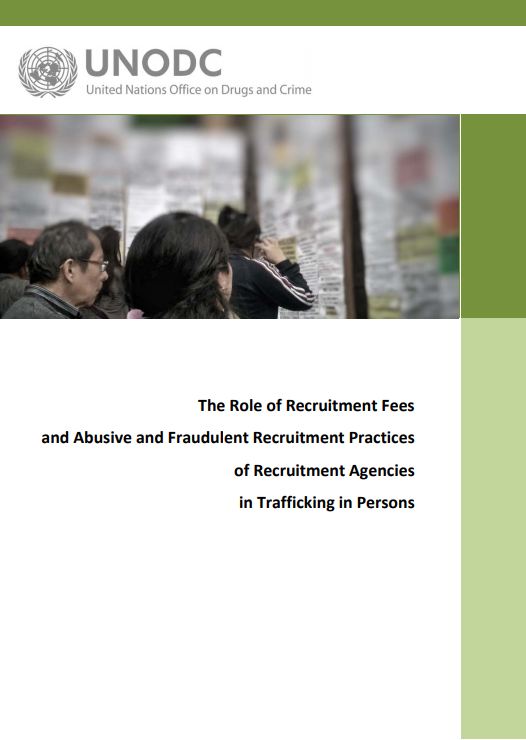The United Nations Office on Drugs and Crime (UNODC), as the guardian of the Protocol to Prevent, Suppress and Punish Trafficking in Persons (the Trafficking in Persons Protocol), assists Member States in their efforts to effectively implement the Trafficking in Persons Protocol and to build comprehensive and effective responses to trafficking in persons. Among other work, UNODC supports Member States through the development of various research and issue papers and reports on trafficking in persons. The purpose of this work is to help improve understanding of the complex nature of the crime of trafficking in persons, with the ultimate goal to allow for better prevention of the crime, prosecution of traffickers, protection of trafficking victims, and creation of more effective partnerships and cooperation among States and between different stakeholders. The present report aims to shed light on one of the burning issues concerning trafficking in persons, namely the linkages between recruitment fees and abusive and fraudulent practices of recruitment agencies and trafficking in persons.
Recruitment agencies can play a legitimate and essential role in facilitating supply and demand in labour markets, across geographies and sectors. In particular, they often facilitate the movement of workers looking for job opportunities outside their home countries. Yet, abusive recruitment practices seem to flourish in all parts of the world. Such practices seem to be closely linked with trafficking in persons.
In many countries recruiters and recruitment agencies charge workers fees for recruitment services that far exceed the legal limits or that might be prohibited altogether. The indebtedness that often follows and the need to repay the debt often drives workers to accept difficult or exploitative working conditions, making them vulnerable to trafficking in persons. In addition, the role of recruitment fees and agencies in trafficking in persons can go beyond just creating vulnerabilities in workers to trafficking in persons. Recruiters and recruitment agencies might be directly involved in trafficking criminal networks aiming to exploit workers.
The purpose of this paper is to examine the relationship between recruitment fees and other abusive and fraudulent practices of recruitment agencies and trafficking in persons, with a particular focus on criminal justice measures to address this relationship. While there have been numerous incidents of abusive recruitment practices and subsequent labour exploitation reported in all parts of the world, little is known about how States respond to the phenomenon and whether they use their anti‐trafficking legislation to prosecute persons involved in such recruitment practices. The paper examines the State practice with a view to highlighting lessons learned and providing recommendations on how to adequately respond to the issue.
Addressing the role of recruitment fees and agencies in trafficking in persons is a challenging undertaking, since the topic has not yet been thoroughly examined and globally the criminal justice responses and measures in this regard appear to be very limited. Yet, it is hoped that the report will increase knowledge and awareness of the linkages between trafficking in persons and abusive recruitment practices and shed light on the existing responses.
It should be noted that the present report is complemented by the report “Regulating labour recruitment to prevent human trafficking and to foster fair migration: models, challenges and opportunities” prepared by the International Labour Organization (ILO), an outcome document of the ILO’s parallel, related research. While these are two separate reports, UNODC and the ILO have developed joint recommendations stemming from both Organizations’ research, which will be launched together with the respective publications of ILO and UNODC.

